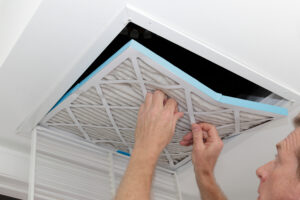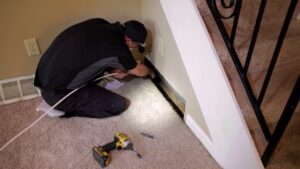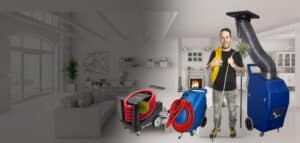How Whole House Purification Systems Can Improve Your Family's Health
Here at Trio Heating & Air, we understand how indoor air quality can directly impact your family’s health and comfort. While many homeowners focus on temperature control, the quality of air circulating through your home deserves equal attention. A whole-house purification system offers comprehensive protection against airborne pollutants that can affect respiratory health. Investing in an HVAC air filtration system means investing in the wellness and comfort of your family.

Why Indoor Air Quality Shouldn’t Be Ignored
Did you know that indoor air can be two to five times more polluted than outdoor air? The American Lung Association reports that indoor air can be up to 100 times worse. Most families spend upwards of 90% of their time indoors, breathing air that may contain dust, pet dander, pollen, mold spores, bacteria, viruses, and volatile organic compounds (VOCs).
Poor indoor air quality has been linked to a variety of troubling health concerns like eye irritation, persistent headaches, and chronic fatigue. Long-term exposure to polluted indoor air may contribute to more serious conditions, including asthma, allergies, and other respiratory illnesses.
Many San Francisco Bay Area homes, particularly older properties or those in high-traffic areas, experience unique air quality challenges due to environmental factors, wildfire smoke, and urban pollution. Appropriate air quality services can help mitigate these risks, including the installation of a whole-home air cleaner.
What Is a Whole House Purification System?
One of the best ways to improve air quality in your home is with a whole-house purification system. The integrated air cleaning solution works with your existing HVAC system to filter and purify all the air circulating throughout your home. Unlike standalone units that only clean air in a single room, HVAC air filtration systems provide comprehensive coverage for every living space.
Modern whole-house purification systems typically include multiple filtration stages:
- High-efficiency particulate air (HEPA) or high-MERV rated filters
- UV light purification technology
- Activated carbon components for odor control
- Photocatalytic oxidation technology
At Trio Heating & Air, we offer advanced whole-house purification systems designed to address the specific indoor air quality concerns of Bay Area residents, from seasonal allergies to wildfire smoke infiltration.
How These Systems Work with Your HVAC
Whole-house air purifiers integrate directly with your existing heating and cooling system, providing continuous air purification wherever your system operates.
The central air purifier is typically installed at the return air duct or attached to your air handler. As air circulates through your home’s existing ductwork, it passes through multiple levels of filtration before being redistributed. The purification process effectively removes microscopic particles, neutralizes bacteria and viruses, and eliminates odors and chemical vapors.
The air scrubber installation process requires professional expertise to maximize efficiency. Our skilled technicians position units strategically within your ductwork system, mounting them securely and ensuring all connections are properly sealed to prevent air leaks that could reduce effectiveness.

Top Health Benefits for Your Family
The benefits of air purifiers are significant. Investing in a whole-home air cleaner delivers several health advantages for everyone in your household.
- Reduced allergies: By removing allergens, an allergy relief air purifier in your home can decrease symptoms like sneezing, itchy eyes, and congestion.
- Asthma management: Cleaner air means fewer triggers for asthma sufferers, possibly helping to reduce the frequency and severity of asthma attacks.
- Elimination of harmful microorganisms: Advanced air purification systems for your home can neutralize bacteria, viruses, and mold spores, helping to prevent the spread of illness between family members.
- Removal of harmful chemicals: Many household products release VOCs that can cause headaches, dizziness, and respiratory challenges. Whole-house purification systems with activated carbon can effectively remove these harmful compounds.
- Better sleep quality: Cleaner air promotes better breathing during sleep, which can improve overall sleep quality and energy levels.
- Protecting vulnerable family members: Children, elderly adults, and anyone with existing health conditions benefit the most from improved indoor air quality.
Whole House vs. Portable Purifiers
There are significant differences between portable units and whole-house purification systems. Most notably, whole-home air cleaners purify all the air flowing through your home’s ventilation system. By contrast, portable units only purify air in a single room, rarely covering more than 300 to 700 feet.
Portable air purifiers need frequent filter changes and cleaning, whereas whole-house systems require maintenance only once or twice per year. A single integrated system is more energy-efficient than running multiple portable units, and also operates quietly within your ductwork, hidden away from sight.
For comprehensive protection throughout your San Francisco Bay Area home, an HVAC air filtration system offers superior performance and convenience.
Choosing the Right System for Your Home
Our skilled technicians work closely with you to select the appropriate air purification system for your home. In offering recommendations, they’ll evaluate several key factors:
- Home size and layout
- Existing HVAC configuration and ductwork
- Specific indoor air quality concerns, like allergies, asthma, and odors
- Budget considerations
- Long-term maintenance plans
To recommend the most effective solutions for your specific needs, our team conducts thorough assessments and considers the unique characteristics of your home. We empower you to make an informed decision based on your budget.
Maintenance Tips for Optimal Air Purification
To maximize the long-term effectiveness and efficiency of your whole-house purification system, follow these helpful tips:
- Replace filters regularly according to manufacturer recommendations
- Schedule regular preventative maintenance and inspections
- Keep vents and returns clear of obstructions
- Maintain humidity levels between 30% and 50%
- Reduce indoor pollutants by continuing basic housekeeping practices
- Consider seasonal maintenance before peak allergy seasons

Is It Time to Upgrade Your Air Filtration?
It may be time to upgrade your indoor air quality solution if you notice the following:
- Frequent respiratory symptoms at home
- Excess dust accumulation throughout your home
- Newly developed allergies or asthma
- Persistent odors despite regular cleaning
You should also consider upgrading if you’re concerned about airborne viruses and illness, or you’ve come to rely on multiple portable air purifiers for different rooms.
An integrated approach to improve air quality in your home provides more comprehensive protection than piecemeal solutions.
Final Thoughts: Breathing Cleaner, Healthier Air
A whole-house purification system represents a sound investment in your family’s long-term health and comfort. By addressing indoor air quality comprehensively, these systems protect against a wide range of pollutants that can affect respiratory health and overall wellness.
At Trio Heating & Air, we’re committed to helping families in Northern California breathe easier with professional indoor air quality services tailored to your specific needs. Contact us today at (415) 233-9302 to schedule your whole-house air purification consultation.
Seal the Deal: How Duct Sealing Can Improve Your Home’s Efficiency
The ductwork in your home’s HVAC system is a circulatory system, delivering warm or cool air to every room. When leaks develop in your air ducts, your comfort and wallet can take a serious hit. Many HVAC systems in the United States fail to meet their rated efficiency due to poor installation and leaky ducts. At Trio Heating & Air, we’ve seen firsthand how professional duct sealing services can vastly improve the efficiency of HVAC systems.
Why Duct Sealing Is Important
Think of your air duct system as a network of pathways. These ducts travel behind walls, through attics, and crawl spaces. When they develop leaks, they lose the heated or cooled air destined for another room in your home.
They’re also pulling in whatever happens to be in those hard-to-reach places. This could include insulation fibers, dust, moisture, mold, and even asbestos particles in older homes. Beyond the obvious waste of energy, air duct leaks can significantly harm indoor air quality and put your family’s health at risk. Above all else, this underscores why duct sealing is important.
The unique San Francisco Bay Area climate presents specific challenges for our HVAC systems. The frequent fog and the marine layer bring in moisture that can accelerate duct deterioration, while our mild winters and warm summers mean your HVAC system likely needs to work all year round. Many Bay Area homes, especially in older neighborhoods, have ducts running through unconditioned spaces like attics, making them more susceptible to leaks and efficiency losses.
Key Duct Sealing Benefits
When you invest in proper duct sealing, you invest in many notable benefits for your home and family.
Enhanced efficiency
When air ducts are properly sealed, conditioned air reaches its intended destination instead of leaking into unused spaces. Duct sealing improves energy efficiency by sealing leaky ducts, which can improve HVAC system performance and efficiency by up to 20%. This direct air delivery means your system maintains comfortable temperatures without working overtime.
Lower utility bills
You can significantly reduce energy bills with duct sealing. Most homeowners see a noticeable difference in their monthly utility bills right away. Given that the Bay Area’s energy costs are among the highest in the country, this benefit is especially significant for local homeowners.
Improved air quality
Sealed ducts prevent contaminants like fog-carried moisture, outdoor allergens, and attic dust from entering your living space. Good indoor air quality is vital for the health of your family members. Properly sealed ducts are especially important during wildfire season to prevent outdoor smoke from infiltrating leaky air ducts.
Consistent home comfort
Along with other duct sealing benefits, this professional service can eliminate frustrating temperature variations between the different rooms in your home. This is especially noticeable in multi-story homes in the Bay Area. Duct sealing can help maintain even temperatures across different floors, keeping your home consistently comfortable from room to room.
Extended equipment life
Another reason why duct sealing is important is when your HVAC system doesn’t have to fight against air duct leaks, it experiences less strain and operates more efficiently. This reduced workload helps prolong the service life of your HVAC system, postponing the need for costly repairs and replacements and reducing maintenance requirements.

Signs Your Ducts May Need Sealing
Look out for these telltale signs that your air ducts need professional attention:
- Excessive condensation around vents during foggy days
- Musty odors when running the system, especially in the morning
- Higher humidity levels indoors than expected
- Unusually high energy bills, especially during peak heating or cooling periods
- Rooms that are constantly too hot or too cold
- Stuffy or uncomfortable air quality
- Visible dust around your air vents
- The HVAC system is running constantly but failing to maintain temperature
- Black marks on the insulation around your ductwork
- Respiratory issues or irritation among household members when the system is running
Questions to Ask Your HVAC Professional
When considering professional duct sealing services, working with qualified technicians is important. Here are a few key questions to discuss:
- What methods and materials will be used for duct sealing?
- How will you identify possible leak points?
- Will you be testing to verify the effectiveness of the air duct sealing?
- How long will the new seals last before they need to be repaired or replaced?
- Do you have any maintenance recommendations to prolong the life of the sealing?
- Can you provide before and after efficiency measurements?
- Are there any specific challenges Bay Area homeowners should be aware of?Do you offer a guarantee or warranty on your work?
- Do you offer financing options and maintenance plans?
DIY vs. Professional Duct Sealing
Some homeowners may consider a DIY approach, but professional duct sealing services offer several advantages. A common misconception is that regular duct tape is sufficient for sealing, but it deteriorates quickly. Some people may believe that small leaks don’t matter, but they can reduce efficiency by as much as 30%. Even new home construction can have duct leakage.
At Trio Heating & Air, our professional approach starts with a comprehensive inspection. Our technicians evaluate your HVAC system using specialized equipment to detect leaks and assess airflow. Next, we clean the air ducts to improve HVAC system performance and remove any debris that could compromise airflow or undermine the duct sealing process.
The professional duct sealing process may include high-quality HVAC sealant tape, high-temperature-resistant silicone sealant, and mechanical fasteners for long-term stability. After sealing, we’ll conduct pressure testing to verify the work's effectiveness and ensure all leaks have been addressed.

Book Professional Duct Sealing Services Today
Don’t let leaky ducts blow your energy bills out of hand. Contact Trio Heating & Air to schedule your professional duct sealing service and start saving on energy bills. Our experienced technicians will thoroughly inspect your air ducts, identify all leak points, and seal them properly for top performance and air quality. Duct sealing is about more than energy savings — it’s about creating a healthier, more comfortable home year-round.
When Is Indoor Air Testing Necessary?
Indoor air testing is generally not recommended on a schedule, like routine HVAC maintenance, but it’s a good idea in many circumstances. That’s because indoor air quality (IAQ) is a greater concern than most homeowners realize. People spend up to 90% of their time indoors and pollutants such as dust, pollen, mold, carbon monoxide, and volatile organic compounds (VOCs) can be highly concentrated. In other words, IAQ can be worse than outdoor air quality.
We recommend IAQ testing for many reasons. The indoor air quality in your home can impact you in several ways, some of which include:
- Health: Exposure to carbon monoxide can be deadly, while dust and other particles can exacerbate allergies and asthma. Mold, VOCs, and some chemicals can trigger illness or long-term health issues.
- Reduced Comfort: If your home has poor indoor air quality, you may be uncomfortable, especially if high humidity, unpleasant odors, and irritating particles or chemicals are present.
- Limited Productivity: Headaches, fatigue, sneezing, coughing, eye irritation, and other symptoms of poor IAQ can affect concentration. A lack of sleep can also reduce productivity.
When Is It Time to Schedule IAQ Testing?
As noted earlier, indoor air testing doesn’t have to be on a schedule. There’s no right or wrong time for it. However, there’s no harm in having your local HVAC contractor test your indoor air quality once a year. That’s up to you. Nevertheless, signs IAQ testing is necessary include the following:
Increased Allergy Symptoms at Home
Allergies don’t only come from dust and pollen. Compounds released by wood flooring, furniture, paint, cleaning products, and other household materials and items can have health effects. The following signs should raise suspicion you have an IAQ problem and should schedule indoor air testing:
- Frequent allergy/asthma attacks while at home.
- Allergy symptoms are present or more prevalent while in your house.
- Your symptoms go away when you leave.
Frequent Colds and Respiratory Problems
A chronic cough, frequent sneezing, a dry throat, or congestion can be caused by indoor air pollutants. These issues may not only be irritating. They can lead to more serious problems if the root cause isn’t addressed. Asthma and lung disease can develop. Therefore, if you or anyone in your household has persistent or recurring colds or respiratory illnesses, consider scheduling IAQ testing in your home.
Unpleasant Odors Become More Persistent
Your HVAC system should do a good job of filtering out odors. If you often notice musty smells, you may have mold. Other odors that can indicate an IAQ issue include cooking oil, cigarette smoke, gas odors, and chemical-like smells. Chemicals from pesticides and personal care products can pollute indoor air.
Some compounds can produce toxic fumes that can be irritating and harmful if breathed in. Other odors can indicate issues, such as a malfunctioning heater, that can release toxins you can’t smell, such as carbon monoxide. Therefore, don’t take the presence of odors lightly; they can indicate a serious indoor air quality problem.
You Have Difficulty Sleeping
High levels of pollution can lead to poor sleep quality. If pollutants are heavily concentrated and the temperature is inconsistent, breathing difficulties can occur during sleep. This can affect your alertness and productivity during the day. It can also lead to sleep apnea, low blood oxygen levels in the brain, and other problems. Over time, cardiovascular disease can develop. If improving ventilation or filtration doesn’t relieve your symptoms, consider having your air quality checked.
Indoor Humidity Is Higher than Usual
You may not think of humid air as being polluted. However, high humidity can be an indoor air quality issue. It can allow mold to grow, make you feel more uncomfortable, and damage sensitive materials and furnishings. Even low humidity can cause damage and health concerns ranging from dry skin to respiratory infections. An air quality test can help determine the source of the problem and identify a solution.
You’re Welcoming a New Baby to Your Home
Indoor air testing should be a priority if you’re preparing to bring a new baby home. Babies have sensitive lungs, so they are more vulnerable to the effects of air pollution. Their immune systems also aren’t fully developed. Therefore, organic and non-organic contaminants can threaten their health and development. An IAQ test can identify harmful culprits you can target, so your home is a healthy environment for your baby.
After a Construction or Renovation Project
Construction activities, no matter what preventive measures are taken, release a lot of dust and debris. Toxic chemicals can be released into the air from various materials and processes. Whether your home was recently constructed, one is being built nearby, or your house was just renovated, professional IAQ testing is a good idea. It can identify pollutants so your HVAC contractor can provide cleaning or filtration solutions as necessary.
Inspecting a New House Before Purchase
We strongly recommend having the IAQ tested before you move into a new home. Older homes can have asbestos and other outdated/banned materials, or issues such as radon may have gone unchecked. Even newer properties can have air quality concerns, as harsh pollutants are found in many construction materials. A professional can clean out the air or install an air filtration or purification system to address any issues.
What Happens During Indoor Air Testing?
When performing IAQ testing, a contractor sets up specialized equipment. The type of devices used depends on the pollutants they’re testing for. Different tests are available to check for VOCs, mold, or carbon monoxide. Radon, a gas found underground that can have long-term health effects, can require several months of testing to accurately detect. A technician may also evaluate humidity levels and your home’s ventilation.
A detailed report is provided after testing is complete. It explains what was found and may also include recommendations. These can include common IAQ solutions like humidifiers/dehumidifiers, ventilation improvements, and whole-home air purification systems.
Contact Trio Heating & Air
At Trio Heating & Air, our licensed technicians perform IAQ testing and inspections to find airborne contaminants in your home. Thorough evaluations allow us to identify specific pollutants and recommend air quality solutions. These include whole-house air purifiers, air scrubbers, or air duct cleaning or sealing. To get started, call (415) 532-2984 and schedule your indoor air testing appointment.
How Do Air Purifiers Work?
Clean air is paramount when it comes to maintaining a healthy living environment. We often assume the air within our homes is pure, but the truth is that indoor air can contain a variety of pollutants that can adversely affect our health. That's where air purification systems come into play. But how do air purifiers work, and what makes them so essential?
Let’s discuss what an air purification system is and how it can transform your home’s indoor air quality.
What Is An Air Purification System?
At its core, an air purification system is designed to clean the air within your home. These systems use a series of filters and technologies to capture and neutralize a wide range of air pollutants, ensuring the air you breathe is of the highest quality.
The Mechanics Behind Air Purification
Now that you know what an air purification system is, you may want to learn more about how they function. Namely, how do air purifiers work? To answer this question, it’s essential to delve deeper into their components and processes.
1. Filters & Their Role in Purification
The most common type of air purifier utilizes High-Efficiency Particulate Air (HEPA) filters. So, how do air purifiers work with HEPA filters?
Essentially, HEPA air purifiers are designed to trap tiny particles from the air, as minuscule as 0.3 microns in size, which include pollutants like pet dander, dust mites, and mold spores. The efficacy of these filters is often represented by their clean air delivery rate, indicating how much clean air they can produce in a specific time frame.
2. Tackling Gaseous Pollutants
Not all air pollutants are particulate. Some, like volatile organic compounds (VOCs), are gaseous. These can arise from household products like paints and aerosol sprays. To combat these, some home air purifiers utilize activated carbon filters. These filters can adsorb these gases, ensuring they don't circulate in your home's air.
3. Neutralizing Bacteria and Viruses
Many advanced air purification systems also incorporate technologies to neutralize bacteria and viruses. UV light is a popular method for this. When these microorganisms are exposed to UV light, their DNA is disrupted, rendering them harmless.
Choosing the Right Air Purifier for Your Home
With the vast array of air purifiers on the market, how can you determine which is best for you?
- Determine the Type of Air Purifier You Need: There are various types of air purifiers, from portable air purifier units ideal for single rooms to whole-house air purifier systems that integrate with your HVAC system.
- Assess Your Home's Air Conditions: Do you have pets? Then, pet dander might be a concern. If anyone in your home has allergies, a system efficient at removing dust mites and pollen would be beneficial. Assessing your specific air conditions can guide you toward the most suitable air purification system for your needs.
Why Consider a Whole-House Air Purification System?
While portable units can be effective, a whole-house air purifier offers the advantage of ensuring every room in your home benefits from clean, purified air. These systems typically integrate with your HVAC system, purifying the air as it circulates.
Highly Efficient & Comprehensive
Whole-house systems are highly efficient, ensuring every corner of your home is covered. With the integration into your HVAC system, the air is continually purified, not just when a standalone unit is switched on.
Tackling a Broad Range of Pollutants
From mold spores to VOCs, a whole-house air purification system is designed to tackle a wide range of air pollutants, ensuring comprehensive protection for your household.
Breathe Easier With Our IAQ Services
So, how do air purifiers work? Hopefully, this guide has helped you learn about the importance of indoor air quality and the installation of whole-house air purification systems.
Are you ready to take the next steps to ensure your home's air is of the highest quality? If you're in The Greater San Francisco Bay Area, CA, or the surrounding area, consider investing in a whole-house air purification system with Trio Heating & Air Conditioning. Not only do we offer top-notch air purification services, but we also provide air duct cleaning in the Bay Area, ensuring your entire HVAC system promotes optimal air quality.
Breathe easier and live healthier with a whole-house air purification system. Contact Trio Heating & Air Conditioning today to find out more about how we can help enhance your home's air quality!
Indoor vs. Outdoor Air Quality: Which Is Worse?
The air quality in the Greater San Francisco Bay Area constantly changes and is heavily affected by things like weather conditions and seasonal factors. Whether it’s indoors or outdoors, the air you breathe significantly impacts your health and well-being. There’s an ongoing debate about indoor vs. outdoor air quality and which one is worse for you. The experts at Trio Heating & Air have some helpful insight about which type of air quality is worse for your health, and what you can do about it.
Indoor vs. Outdoor Air Quality: A Quick Comparison
Air quality and health are closely related, but what’s the difference between outdoor and indoor air pollution and quality? The term air quality refers to the condition or state of the air within the surrounding environment and is influenced by both outdoor sources and indoor materials and activities. In terms of the impact of poor air quality, indoor air may be more dangerous because it doesn’t have the same level of ventilation and access to fresh air as outdoor air.

Common Sources of Indoor Air Pollution
It may be surprising to learn that many sources of indoor air pollution could impact your health. Inadequate ventilation can increase indoor pollutant levels by not adding enough outdoor air to the inside of your home, which can dilute the emissions that come from these indoor sources.
Here are some of the most common sources of indoor air pollution:
- Building materials like flooring products, paint, and drywall
- Cleaning products that contain various chemicals
- Furnishings, paint, and other products that emit volatile organic compounds (VOCs)
- Burning fuels like wood, gas, or kerosene for heating or cooking
- Pests, dust mites, mold, pollen, and pet dander
- Household activities like cooking and smoking
- Outdoor pollutants like smog that enter the home
- Improper or inadequate routine HVAC maintenance
Understanding Outdoor Air Pollution and Its Effects
Outdoor air pollution levels are significantly influenced by human activities, including transportation (such as cars, buses, and airplanes), industrial processes, and waste disposal. It’s also affected by natural phenomena like wildfires and dust storms.
Outdoor air is generally more ventilated and diffused than indoor air, but still contains harmful pollutants that impact indoor air quality as well. The outdoor air pollution effects over both the long and short term may have a significantly negative impact on human health and well-being.
How Poor HVAC Maintenance Makes Indoor Air Quality Worse
Routine AC maintenance and air quality are closely related. Failing to schedule routine preventative HVAC maintenance may worsen indoor air quality over time. Here’s how poor HVAC maintenance affects indoor air quality:
- Neglecting to replace blocked or clogged HVAC air filters prevents the system from trapping airborne pollutants, such as dust, pet dander, mold spores, and other contaminants.
- Moisture buildup in poorly maintained HVAC systems supports the growth of harmful mold and mildew, both known to cause a variety of health issues.
- Leaky, cracked, or missing ductwork may allow various harmful airborne particles to enter your home.
- A poorly maintained HVAC system often has airflow issues that restrict clean air from flowing through your vents, causing you to breathe contaminated, stale air rather than fresh, clean air.

Health Impacts of Poor Air Quality (Indoors and Out)
Indoor and outdoor air pollution may cause a variety of health issues. These issues may appear shortly after a single exposure or after repeated, long-term exposure to certain pollutants. Some long-term effects may be severely debilitating or even fatal and can show up years after exposure has occurred, while prolonged exposure to certain pollutants like carbon monoxide can result in death.
Here are some of the health impacts associated with indoor and outdoor air pollution:
- General malaise: Many people exposed to indoor and outdoor pollution experience symptoms such as eye, nose, and throat irritation, headache, dizziness, and fatigue.
- Respiratory issues: Exposure to both outdoor and indoor air pollution is associated with increased asthma attacks and other respiratory issues, including chest tightness, shortness of breath, and wheezing.
- Cardiovascular impacts: Long-term exposure to indoor and outdoor pollution may increase the risk of heart attacks or other cardiovascular issues, such as irregular heartbeats.
- Reduced lung function: Exposure to any form of air pollution may impair lung capacity and make breathing more difficult, both in the short term and long term.
- Long-term impacts: Some people may develop chronic respiratory diseases, lung cancer, or immune system impairments after long-term exposure to indoor and outdoor air pollution.
What Can You Do About It?
Fortunately, there are several steps you can take to improve the air quality in your home. Knowing how to improve indoor air quality is the best way to keep you and your family healthy and safe. Professional air quality monitoring provides you with detailed insights and the information you need to make well-informed decisions.
The home air quality solutions provided by Trio are designed to help maintain your home’s indoor air quality, keeping it pure and clean.
- Whole-house purification systems: A whole-house air purification system from Trio works to clean the air in your home, trapping and removing harmful bacteria, neutralizing smoke and mildew, and proactively preventing airborne irritants like dust mites from entering the air.
- Air scrubbers: An HVAC air scrubber is a specialized air filtration system that connects to your ductwork and removes harmful contaminants, such as viruses, bacteria, and debris, when the HVAC fan is in operation.
- Air duct sealing: Sealing air ducts eliminates leaks, improves airflow, enhances energy efficiency, and prevents moisture, dust, and other harmful materials from entering your vents when the HVAC system is in operation.
- Air duct services: Routinely scheduling Trio to clean your air ducts and replace the filters is another smart way to keep your home’s indoor air quality safe and clean.

Contact Trio Today!
When it comes to indoor vs outdoor air quality and which is worse, the answer depends on the proactive measures you take and your level of exposure to both indoor and outdoor pollutants. The team at Trio provides comprehensive professional indoor air quality services in the Greater San Francisco Bay Area designed to keep your home’s indoor air as clean and healthy as possible.
Contact us today to schedule an indoor air quality (IAQ) inspection or one of our other expert indoor air quality services.
How to Sanitize Your Home and your Air Ducts While in Quarantine
The coronavirus pandemic has gripped the entire world by storm. There are increasing panic and a steadily rising death count. Schools and colleges have closed, and offices have started directing employees to work from home.
Many individuals have started practicing self-isolation, and in times like these, it has become more and more essential to sanitize your home and keep yourself clean. For those of us who are confused about how to go about sanitizing their home, then this article is perfect for you.
In this article, we are going to go over the ways you can keep your home sanitized and germ-free, and we are also going to talk about some deep-cleaning measures that you can take.
How To Keep Your Home Virus-Free
Since we are now in quarantine and are regularly saving up on gas bills and also commute time, we can now focus more on our homes. The best way to keep your home virus-free is to treat your home as an ICU and make sure that nothing goes out or comes in without being thoroughly disinfected.
Keep washing and sanitizing your hands every chance you get. Avoid touching your face with your hands and always keep a hand sanitizer handy and within reach. Invest in a few disinfectant sprays and use them to clean and wipe doorknobs, handles, switchboards, and anything that you use frequently.

Also, keep moisturizing your hands to prevent them from becoming too dry. If you can’t find any disinfectant, you can easily make your disinfectant at home. All you need is a spray bottle, a household bleach, and a pair of rubber gloves. Household bleach is a powerful disinfectant that you can use to disinfect all the surfaces in your home.
You can also mix a small quantity of Dettol or any strong liquid disinfectant with water and use it in a spray bottle to disinfect the entire home. All you need to do is spray the mixture on the familiar places that people end up touching and then go over those places with a wet cloth. Measures like these will help in sanitizing your home effectively, and you will also end up saving much time with the spray bottle.
Think About Deep Cleaning
While we have time on our hands, we might as well invest a little time into making sure that our entire home is deep cleaned to perfection. You can invest in air purifier systems that can help filter the air that comes into your home.
You can also consider getting your air ducts cleaned while in quarantine. Dirty air ducts can act as a breeding site for most germs and bacteria. By getting your ducts cleaned while in quarantine, you will be able to take advantage of the many air duct cleaning benefits while in quarantine.
You can talk to duct cleaning professionals and ask them about the necessary precautions they are taking to ensure that the air ducts are clean and that their workers follow proper sanitization protocols.
Getting your ducts cleaned and your HVAC filter cleaned can help you monitor the quality of air that makes its way into our homes. It will also help you prevent any viruses from coming into your house through ventilation.
HEPA filters have been tested to be able to catch most viruses and bacteria particles from the air and prevent them from coming into your home. You can get a HEPA filter installed in your HVAC air duct, which can help benefit and protect you from the coronavirus while in quarantine.

The HEPA filter catches most fine particles and therefore has to be cleaned out regularly. While cleaning the filter, make sure you cover yourself adequately and disinfect yourself properly after cleaning the filter to make sure that you don’t catch the virus. A good way to make sure that you don’t bring the virus in the house is by sanitizing yourself before stepping in the house and immediately taking a shower without touching anything. Discard and wash the clothes you were wearing immediately.
You can also get your air ducts sanitized with chemicals while getting them cleaned. Deep cleaning can help protect you and the ones you love from the harmful effects of most viruses. It can also help in lowering your electricity bill and can help lessen the workload on your HVAC system.
